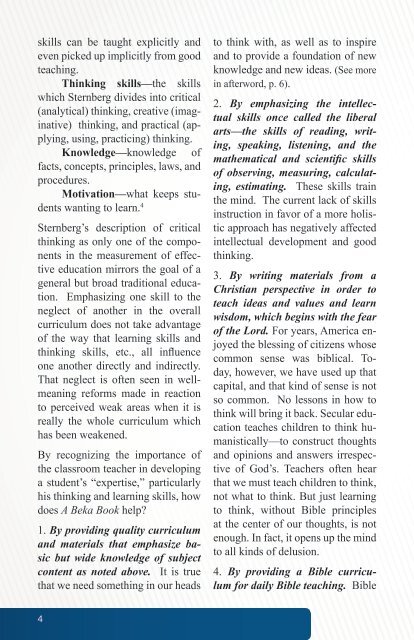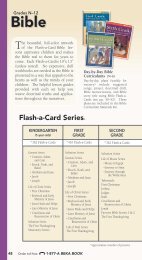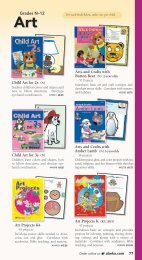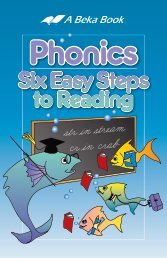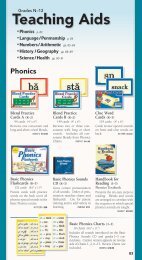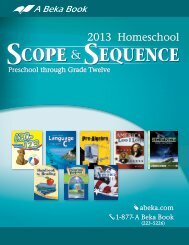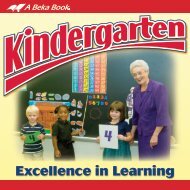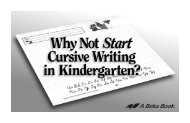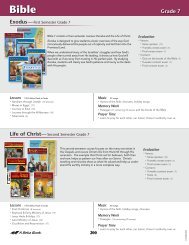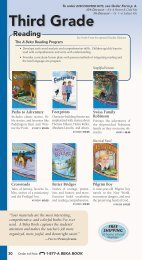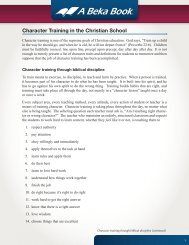ABB Some Thoughts on Thinking (PDF) - A Beka Book
ABB Some Thoughts on Thinking (PDF) - A Beka Book
ABB Some Thoughts on Thinking (PDF) - A Beka Book
You also want an ePaper? Increase the reach of your titles
YUMPU automatically turns print PDFs into web optimized ePapers that Google loves.
skills can be taught explicitly and<br />
even picked up implicitly from good<br />
teaching.<br />
<strong>Thinking</strong> skills—the skills<br />
which Sternberg divides into critical<br />
(analytical) thinking, creative (imaginative)<br />
thinking, and practical (applying,<br />
using, practicing) thinking.<br />
Knowledge—knowledge of<br />
facts, c<strong>on</strong>cepts, principles, laws, and<br />
procedures.<br />
Motivati<strong>on</strong>—what keeps students<br />
wanting to learn. 4<br />
Sternberg’s descripti<strong>on</strong> of critical<br />
thinking as <strong>on</strong>ly <strong>on</strong>e of the comp<strong>on</strong>ents<br />
in the measurement of effective<br />
educati<strong>on</strong> mirrors the goal of a<br />
general but broad traditi<strong>on</strong>al educati<strong>on</strong>.<br />
Emphasizing <strong>on</strong>e skill to the<br />
neglect of another in the overall<br />
curriculum does not take advantage<br />
of the way that learning skills and<br />
thinking skills, etc., all influence<br />
<strong>on</strong>e another directly and indirectly.<br />
That neglect is often seen in wellmeaning<br />
reforms made in reacti<strong>on</strong><br />
to perceived weak areas when it is<br />
really the whole curriculum which<br />
has been weakened.<br />
By recognizing the importance of<br />
the classroom teacher in developing<br />
a student’s “expertise,” particularly<br />
his thinking and learning skills, how<br />
does A <strong>Beka</strong> <strong>Book</strong> help?<br />
1. By providing quality curriculum<br />
and materials that emphasize basic<br />
but wide knowledge of subject<br />
c<strong>on</strong>tent as noted above. It is true<br />
that we need something in our heads<br />
to think with, as well as to inspire<br />
and to provide a foundati<strong>on</strong> of new<br />
knowledge and new ideas. (See more<br />
in afterword, p. 6).<br />
2. By emphasizing the intellectual<br />
skills <strong>on</strong>ce called the liberal<br />
arts—the skills of reading, writing,<br />
speaking, listening, and the<br />
mathematical and scientific skills<br />
of observing, measuring, calculating,<br />
estimating. These skills train<br />
the mind. The current lack of skills<br />
instructi<strong>on</strong> in favor of a more holistic<br />
approach has negatively affected<br />
intellectual development and good<br />
thinking.<br />
3. By writing materials from a<br />
Christian perspective in order to<br />
teach ideas and values and learn<br />
wisdom, which begins with the fear<br />
of the Lord. For years, America enjoyed<br />
the blessing of citizens whose<br />
comm<strong>on</strong> sense was biblical. Today,<br />
however, we have used up that<br />
capital, and that kind of sense is not<br />
so comm<strong>on</strong>. No less<strong>on</strong>s in how to<br />
think will bring it back. Secular educati<strong>on</strong><br />
teaches children to think humanistically—to<br />
c<strong>on</strong>struct thoughts<br />
and opini<strong>on</strong>s and answers irrespective<br />
of God’s. Teachers often hear<br />
that we must teach children to think,<br />
not what to think. But just learning<br />
to think, without Bible principles<br />
at the center of our thoughts, is not<br />
enough. In fact, it opens up the mind<br />
to all kinds of delusi<strong>on</strong>.<br />
4. By providing a Bible curriculum<br />
for daily Bible teaching. Bible<br />
4


